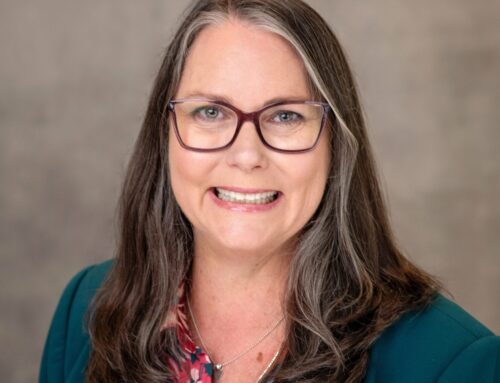In today’s ever-evolving landscape of education, the spotlight is increasingly shining on the critical role of mental health and well-being in the lives of students. We recently had the privilege of sitting down with Jill Bohenkamp, Associate Professor of Psychiatry within the National Center for School Mental Health, Division of Child and Adolescent Psychiatry at the University of Maryland School of Medicine. During our conversation, Jill shared her personal and professional journey, and her ongoing commitment to championing mental health initiatives for students nationwide.
Professional Journey
I completed my Ph.D. in Clinical and School Psychology at University of Virginia. I did additional training at Children’s National Medical Center and then started working at the National Center for School Mental Health at the University of Maryland School of Medicine. I initially started as a Post Doctoral Fellow and then joined the faculty in 2014. I’m currently an Associate Professor of Psychiatry within the National Center for School Mental Health, Division of Child and Adolescent Psychiatry at the University of Maryland School of Medicine.
Current Role
My work focuses on building national, state, and local capacity to develop and sustain comprehensive school mental health systems via teaching, training, and technical assistance. I currently co-lead a national learning collaborative, the Whole School, Whole Community, Whole Child Emotional Well-Being Learning Collaborative, funded by the Centers for Disease Control and Prevention, that focuses on advancing health equity in mental health services in schools and youth leadership. We work directly with states and school districts to support them in increasing and enhancing the work they do to support the well-being of their school community. I’m also a licensed Clinical Psychologist in the state of Maryland and supervise trainee research and clinical practice.
Motivations
I was always interested in what we can do to help support people to thrive. I see school mental health as an opportunity to build well-being and ensure that all youth are receiving what they need to succeed. If all schools are focusing on this, we have the opportunity to make a difference in how we are preparing youth for future success.
I am amazed daily at the impressive school mental health work happening in schools across the U.S. and the significant and long-lasting impact it has for youth in those schools. It is motivating to see that change and know the impact.
Challenges
System change takes time and I have to remember to be patient and dream big but start with small achievable steps.
Professional Insights
School counselors support students to be successful in school in so many ways. They work with numerous other school and community personnel on the school mental health team to ensure that every student has access to mental health promotion and provide prevention and intervention for students who need it.
Personal Insights
The Nature Fix: Why Nature Makes Us Happier, Healthier and More Creative, by Florence Williams is an awesome, very readable book with all of the empirical data about how nature is good for our health and well-being. In terms of a skill I’d like to improve on, I’m still working on trying to unplug more. I promote wellness in my own life by giving myself permission to take a break and especially to get outside and go for a run tech-free.
National Center for School Mental Health (NCSMH)
The mission of the National Center for School Mental Health (NCSMH) is to strengthen policies and programs in school mental health to improve learning and promote success for America’s youth. Our goals are to:
1. Advance high-quality, sustainable comprehensive school mental health systems at school, district, state, regional, and national levels.
2. Conduct research and evaluation on mental health promotion, prevention, and intervention in schools and other aspects related to the planning, delivery, and continuous quality improvement of high quality, sustainable school mental health systems.
3. Train and support diverse stakeholders and a multidisciplinary workforce in understanding, promoting, and advancing child, adolescent, and young adult mental health and wellbeing.
The center has many resources and services to help schools and educators address student mental health and well-being. You can find them on our website at Resources | University of Maryland School of Medicine (schoolmentalhealth.org)
Or on The SHAPE System, our free online workspace for individuals, schools, districts and states to advance school mental health. SHAPE – School Health Assessment and Performance Evaluation (theshapesystem.com)
A great resource that I often recommend is Classroom Well-Being Information and Strategies for Educators (Classroom WISE). Classroom WISE is a FREE 3-part training package that assists K-12 educators and school staff in supporting the mental health of students in the classroom. Classroom WISE There is also an awesome video library with quick 1-5 minute videos from real teachers about ways they support student mental health in their classroom. Video Library — Classroom WISE
We also provide direct support for schools, districts and states through many different learning collaboratives and training and technical assistance opportunities. You can reach out to us at ncsmh@som.umaryland.edu
We also host the Annual Conference on Advancing School Mental Health every year. This year it is in New Orleans, LA December 5-7t. Consider joining us! Annual Conference | University of Maryland School of Medicine (schoolmentalhealth.org)
You can also stay in touch with us and learn about new opportunities and resources. Listserv & Newsletters | University of Maryland School of Medicine (schoolmentalhealth.org) Or on Twitter @NCSMHTweets
Final Message for Students
My message for students this back-to-school season is to take care of yourself, check in about how you are doing, focus on doing things that make you feel calm and happy, and reach out to a trusted adult if you need help. You are your best advocate for making sure you have what you need to succeed and have great ideas about what you and your classmates need to support your mental health and well-being. Use your voice, talk with your teachers and other adults in your school about your ideas to support student mental health.




